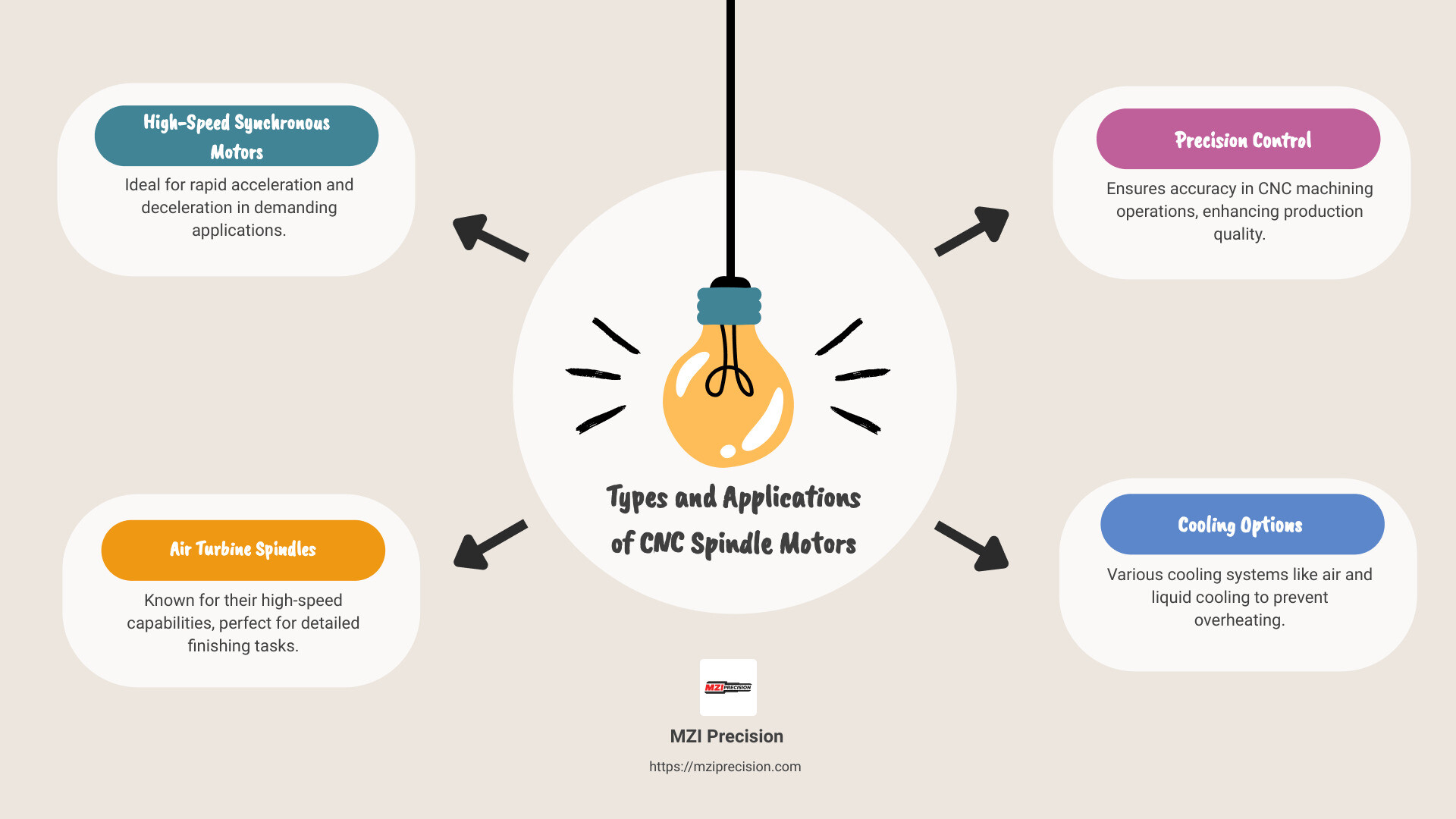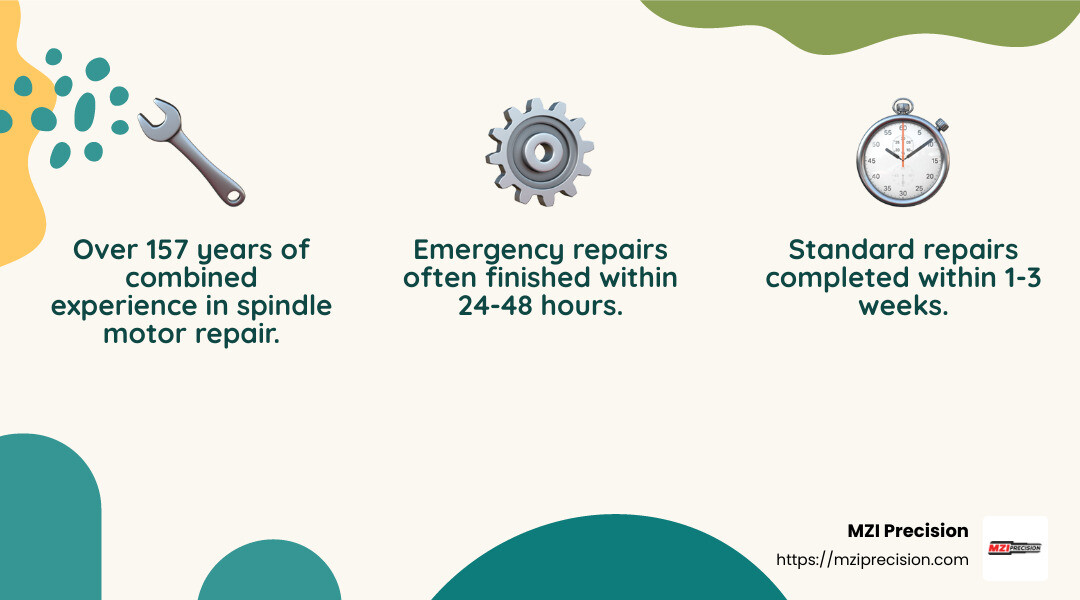Spindle Motor CNC is an essential component in industrial manufacturing, driving the precision and efficiency crucial for tasks like milling, turning, and drilling. If you’re looking for a quick understanding, here’s what you need to know:
- Key Function: Spindle motors are the powerhouse of CNC machines, responsible for rotating the cutting tool or workpiece.
- Types Available: Options include high-speed synchronous motors and durable air turbine spindles, each suited for different tasks and materials.
- Applications: From aerospace to medical device manufacturing, spindle motors improve precision and improve production efficiency.
In industrial machining, the spindle motor is the heart of a CNC machine, setting the pace for operations that require high-speed, precision work. Whether you’re in aerospace or any other hi-tech industry, understanding the distinct types of spindle motors can be a game-changer. Synchronous spindle motors excel in applications demanding rapid acceleration and deceleration, while air turbine spindles are known for their high-speed capabilities, suitable for detailed finishing tasks.
For companies needing reliability and robust service, MZI Precision stands out with expertise in industrial spindle repair and rebuilding. They are a trusted partner, known for exceptional service and support, ensuring your machinery stays operational and productive. This article digs into the complexities of CNC spindles, offering you the insights needed to power up your operations with the best spindle motors.

Understanding CNC Spindle Motors
When it comes to CNC machining, the spindle motor is the driving force behind precision and efficiency. This powerful component is responsible for rotating the cutting tool or workpiece, making all the intricate cutting, drilling, and milling possible.
Spindle Motor Function
Think of the spindle motor as the engine of your CNC machine. Its primary role is to convert electrical energy into mechanical motion, driving the spindle at varying speeds. This allows for precise control over the machining process, which is crucial for achieving high-quality results in industrial manufacturing.
Power and Speed
Spindle motors come in different power ratings and speed capabilities, custom to various machining needs. For instance, synchronous spindle motors are designed for tasks that require frequent acceleration and deceleration, such as tapping or small parts turning. These motors are marked by an ‘S’ in their model name and are ideal for high-speed operations on large workpieces.
On the other hand, air turbine spindles offer remarkable high-speed performance, making them perfect for detailed finishing tasks. They can run continuously without the need for a duty cycle, thanks to their air-cooled ceramic bearings, which improve reliability and extend service life.
Why Power and Speed Matter
The right combination of power and speed is vital for optimizing machining operations. High-speed spindle motors, like those used in aerospace and medical device manufacturing, allow for fine precision cuts and smooth finishes. Meanwhile, motors with higher power ratings are better suited for heavy-duty cutting operations, providing the necessary torque to handle tough materials.
Understanding these aspects of spindle motors is essential for selecting the right motor for your specific industrial needs. Whether you’re focused on precision or power, MZI Precision offers a range of spindle solutions to keep your CNC machines running at peak performance.
In the next section, we’ll explore the top spindle motors for industrial manufacturing, highlighting the features that set them apart in the market.
Top Spindle Motors for Industrial Manufacturing
When it comes to industrial manufacturing, having the right spindle motor can make all the difference. Let’s dig into some of the top options available for high-speed operations and precision tasks.
High-Speed Spindles
High-speed spindles are a game-changer in industrial settings. They are designed to operate at extremely high RPMs, ensuring smooth and precise cuts. These spindles are particularly useful in industries like aerospace and medical device manufacturing, where precision is non-negotiable. The ability to maintain high speeds without slowing down is crucial for time-sensitive projects.
Synchronous Motors
Synchronous spindle motors are known for their efficiency in applications requiring frequent acceleration and deceleration. They are ideal for tasks like tapping and turning small parts. These motors ensure consistent performance and are often marked with an ‘S’ in their model names. This consistency is vital for operations where precision and timing are critical.
Air Turbine Spindles
Air turbine spindles stand out due to their unique technology. Unlike traditional spindle speeders, these high-speed spindles load into CNC machines just like any other spindle. They are available in various tool holders, making them versatile for different CNC setups. One of the key benefits is their ability to run continuously without a duty cycle, thanks to their air-cooled ceramic bearings. This means less downtime and more productivity on the shop floor.
Moreover, these spindles help extend the life of your main CNC spindle by taking on the high-speed, detailed work. This reduces wear and tear, saving on repair costs and minimizing machine downtime. Users have reported 2-micron accuracy and no thermal effects, which is a testament to their precision and reliability.
“Micro end mills and small carbide end mills love speed! High speed optimizes your micro-cutting tool life and finish.”
Choosing the right spindle motor is crucial for optimizing your manufacturing processes. Whether you need high-speed performance or reliable synchronous operation, understanding the features and benefits of each type can guide you in making the best choice for your industrial needs.
In the next section, we’ll dive into key features to consider when selecting a spindle motor, focusing on precision control, cooling options, and noise levels.
Key Features to Consider
When selecting a Spindle Motor CNC for industrial manufacturing, there are several key features to keep in mind. These features can significantly impact the performance, efficiency, and longevity of your CNC machine.
Precision Control
Precision is paramount in industrial settings. High precision spindles are equipped with advanced bearing technology, such as hybrid ceramic bearings or angular contact ball bearings. These bearings ensure high-speed operation with minimal friction and heat, resulting in more accurate and stable machining. This precision is essential for industries like aerospace, where even the smallest deviation can lead to significant issues.
Cooling Options
Cooling is another critical consideration. You can choose between air-cooled and water-cooled spindles. Both types are designed to maintain optimal operating temperatures, but they have distinct advantages:
- Air-Cooled Spindles: These are generally easier to install and maintain. They are suitable for most applications, especially if you’re working primarily with wood or other less demanding materials.
- Water-Cooled Spindles: These are ideal for more intensive tasks, such as carving aluminum. They offer superior cooling, which allows for longer run times without overheating. This can be particularly beneficial for operations requiring continuous high-speed machining.
The choice between these cooling options often depends on the materials you plan to work with and your specific operational needs.
Noise Levels
Noise levels can affect both the working environment and the health of operators. High precision spindles are designed to operate quietly, reducing workplace noise pollution. Water-cooled spindles, in particular, tend to be quieter than their air-cooled counterparts.
“Compared to a palm router, Spindles are virtually quiet. A low hum for the most part.”
This low noise level not only contributes to a more comfortable workspace but also minimizes disruptions, allowing operators to focus on precision tasks without distraction.
Considering these features—precision control, cooling options, and noise levels—will help you select the best spindle motor for your industrial manufacturing needs. Making an informed choice ensures that your CNC machines operate efficiently and effectively, leading to better results and prolonged equipment life.
In the next section, we’ll address some frequently asked questions about spindle motors, including how to identify a bad spindle and the differences between servo motors and spindle motors.
Frequently Asked Questions about Spindle Motor CNC
What is a spindle motor in CNC?
A CNC spindle motor is a key component in CNC machines. It is the motorized part that rotates cutting tools, allowing them to cut, drill, or mill materials with precision. The spindle motor’s ability to maintain consistent speed and torque is crucial for achieving accurate and high-quality machining results.
In industrial manufacturing, these motors are designed to handle high-speed operations and frequent changes in speed and direction. They are built with durable materials to withstand the demands of continuous use.
How do I know if my CNC spindle is bad?
Recognizing the signs of a failing spindle motor can save you from costly repairs and downtime. Here are some common indicators:
- Excessive Noise: If you notice unusual sounds, such as grinding or screeching, it could signal a problem with the bearings or other internal components.
- Vibration: Excessive vibration during operation can indicate misalignment or wear in the spindle motor. This can lead to poor machining results and further damage if not addressed.
- Overheating: A spindle motor that becomes excessively hot may have cooling issues or internal damage. Overheating can significantly reduce the lifespan of the motor.
Spotting these issues early allows for timely maintenance and repair, ensuring the longevity and performance of your CNC machine.
What is the difference between a servo motor and a spindle motor?
Both servo motors and spindle motors play vital roles in CNC machines, but they serve different purposes:
- Servo Motors: These are used for precise positioning and velocity control. They are ideal for applications requiring accurate movement and control, such as robotic arms or CNC axes.
- Spindle Motors: These are designed for continuous rotation at high speeds, making them suitable for cutting, drilling, and milling tasks. They focus on maintaining consistent speed and torque rather than precise positioning.
Understanding these differences helps in selecting the right motor for your specific CNC applications and ensuring optimal machine performance.
In the next section, we will conclude our exploration of spindle motors and highlight the exceptional service and repair options offered by MZI Precision.
Conclusion
When it comes to maintaining the efficiency and longevity of your CNC machines, MZI Precision stands at the forefront of spindle motor repair and rebuilding. Our expertise in handling OEM spindles ensures that your machinery runs smoothly, minimizing downtime and maximizing productivity.
At MZI Precision, we understand the critical role that spindle motors play in industrial manufacturing. With over 157 years of combined experience, our team is equipped to tackle any repair challenge. We don’t just fix problems; we improve performance and reliability. This commitment to excellence is what sets us apart.
Our repair process is thorough and precise. We use state-of-the-art technology for dynamic balancing, vibration analysis, and meticulous testing. This ensures that every spindle motor we work on returns to peak condition. Plus, with our quick turnaround times—standard repairs in 1-3 weeks and emergency repairs often within 24-48 hours—you won’t have to wait long to get back to work.

We also offer custom solutions to upgrade your spindle motors, such as air purge and ceramic bearings, further extending the life of your machinery. Our one-year warranty on all repairs provides peace of mind, knowing that our work is built to last.
Choosing MZI Precision means choosing a partner in success. Our exceptional service and support ensure that your CNC machines continue to operate at their best. Trust us to power up your CNC operations with top-notch spindle motor repair and rebuilding services. For more information, visit our CNC Spindle Motor Repair page and experience the MZI Precision difference today.



